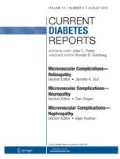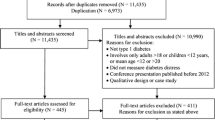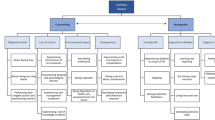Abstract
Purpose of Review
Emerging adulthood (ages 18–29) presents many emotional, social, and developmental challenges that can contribute to an increased sense of burden when managing type 1 diabetes (T1D). Diabetes distress (DD) is the concept that captures the emotional burden, frustrations, and worries resulting from living with T1D. This integrative review sets out to examine the impact of developmental context by answering this question: How do the challenges of emerging adulthood inform our understanding of DD?
Recent Findings
DD is highly prevalent in emerging adults and occurs at higher rates than in other age groups. Qualitative studies reveal that DD is embedded within the developmental challenges specific to living with T1D during this stage.
Summary
Quantitative studies reveal the prevalence and correlates of DD in this age group, and qualitative studies augment these findings by capturing the scope and complexity of the emotional burden of living with T1D as an emerging adult.
Similar content being viewed by others
Notes
One group in Belgium examined DD in multiple studies with emerging adults; however, the authors used modified versions of the PAID and did not report total DD scores, only subscales. The results of these studies could not be compared with the other measures of DD used in this review [63,64,65,66,67,68,69].
References
Papers of particular interest, published recently, have been highlighted as: • Of importance
McCarthy MM, Grey M. Type 1 diabetes self-management: from emerging adulthood through older adulthood. Diabetes Care. 2018;41(8):1608–14.
Foster NC, Beck RW, Miller KM, Clements MA, Rickels MR, DiMeglio LA, et al. State of type 1 diabetes management and outcomes from the T1D exchange in 2016-2018. Diabetes Technol Ther. 2019;21(2):66–72.
Helgeson VS, Vaughn AK, Seltman H, Orchard T, Libman I, Becker D. Trajectories of glycemic control over adolescence and emerging adulthood: an 11-year longitudinal study of youth with type 1 diabetes. J Pediatr Psychol. 2018;43(1):8–18.
Schwandt A, Hermann JM, Rosenbauer J, Boettcher C, Grulich-Henn J, Dunstheimer D, et al. Longitudinal trajectories of metabolic control from childhood to young adulthood in type 1 diabetes from a large German/Austrian registry: a group-based modeling approach. Diabetes Care. 2017;40(3):309–16.
Pettus JH, Zhou FL, Shepherd L, Preblick R, Hunt PR, Paranjape S, et al. Incidences of severe hypoglycemia and diabetic ketoacidosis and prevalence of microvascular complications stratified by age and glycemic control in U.S. adult patients with type 1 diabetes: a real-world study. Diabetes Care. 2019.
Bryden KS, Dunger DB, Mayou RA, Peveler RC, Neil HAW. Poor prognosis of young adults with type 1 diabetes: a longitudinal study. Diabetes Care. 2003;26(4):1052–7.
Berg CA, Wiebe DJ, Suchy Y, Turner SL, Butner J, Munion A, et al. Executive function predicting longitudinal change in type 1 diabetes management during the transition to emerging adulthood. Diabetes Care. 2018;41(11):2281–8.
Northam EA, Lin A, Finch S, Werther GA, Cameron FJ. Psychosocial well-being and functional outcomes in youth with type 1 diabetes 12 years after disease onset. Diabetes Care. 2010;33(7):1430–7.
Baucom KJW, Turner SL, Tracy EL, Berg CA, Wiebe DJ. Depressive symptoms and diabetes management from late adolescence to emerging adulthood. Health Psychol. 2018;37(8):716–24.
Monaghan M, Helgeson V, Wiebe D. Type 1 diabetes in young adulthood. Curr Diabetes Rev. 2015;11(4):239–50.
Peters A, Laffel L, American Diabetes Association Transitions Working Group. Diabetes care for emerging adults: recommendations for transition from pediatric to adult diabetes care systems: a position statement of the American Diabetes Association, with representation by the American College of Osteopathic Family Physicians, the American Academy of Pediatrics, the American Association of Clinical Endocrinologists, the American Osteopathic Association, the Centers for Disease Control and Prevention, Children with Diabetes, The Endocrine Society, the International Society for Pediatric and Adolescent Diabetes, Juvenile Diabetes Research Foundation International, the National Diabetes Education Program, and the Pediatric Endocrine Society (formerly Lawson Wilkins Pediatric Endocrine Society). Diabetes Care. 2011;34(11):2477–85.
Arnett JJ. Emerging adulthood : the winding road from the late teens through the twenties. 2nd edition ed. New York: Oxford University Press; 2015.
Fisher L, Gonzalez JS, Polonsky WH. The confusing tale of depression and distress in patients with diabetes: a call for greater clarity and precision. Diabet Med. 2014;31(7):764–72.
Kalra S, Verma K, Balhara Y. Diabetes distress. Journal of Social Health and Diabetes. 2018;6(1):4–7.
Sturt J, Dennick K, Due-Christensen M, McCarthy K. The detection and management of diabetes distress in people with type 1 diabetes. Current Diabetes Reports. 2015;15(11):101.
• Hagger V, Hendrieckx C, Sturt J, Skinner T, Speight J. Diabetes distress among adolescents with type 1 diabetes: a systematic review. Curr Diabetes Rep. 2016;16(1):1–14. This paper is a systematic review of DD in adolescents.
Gonzalez J, Fisher L, Polonsky W. Depression in diabetes: have we been missing something important? Diabetes Care. 2011;34(11):2488.
Fisher L, Hessler D, Polonsky W, Strycker L, Guzman S, Bowyer V, et al. Emotion regulation contributes to the development of diabetes distress among adults with type 1 diabetes. Patient Education & Counseling. 2018;101(1):124–31.
Nicolucci A, Kovacs Burns K, Holt RI, Comaschi M, Hermanns N, Ishii H, et al. Diabetes Attitudes, Wishes and Needs second study (DAWN2): cross-national benchmarking of diabetes-related psychosocial outcomes for people with diabetes. Diabet Med. 2013;30(7):767–77.
Israel L-G, Consuelo B-U, Raúl C-L, Moisés M-A, Rafael V-T, Silvia Q, et al. Emotional dysfunction associated with diabetes in Mexican adolescents and young adults with type-1 diabetes. Salud Publica Mex. 2003;45(1):13–8.
Joensen LE, Tapager I, Willaing I. Diabetes distress in type 1 diabetes—a new measurement fit for purpose. Diabet Med. 2013;30(9):1132–9.
• Dennick K, Sturt J, Speight J. What is diabetes distress and how can we measure it? A narrative review and conceptual model. Journal of Diabetes Complications. 2017;31(5):898–911. This paper is a thorough review of all measures of DD in adults.
• Byrne M, O’Connell A, Egan AM, Dinneen SF, Hynes L, O’Hara MC, et al. A core outcomes set for clinical trials of interventions for young adults with type 1 diabetes: an international, multi-perspective Delphi consensus study. Trials. 2017;18(1). Consensus statement on recommendations for design of future studies in emerging adults.
Polonsky AB, Lohrer P, Welch G, Jacobson A, Aponte J, et al. Assessment of diabetes-related distress. Diabetes Care. 1995;18(6):754–60.
Polonsky FL, Earles J, Dudl RJ, Lees J, Mullan J, et al. Assessing psychosocial distress in diabetes: development of the diabetes distress scale. Diabetes Care. 2005;28(3):626–31.
Snoek FJ, Bremmer MA, Hermanns N. Constructs of depression and distress in diabetes: time for an appraisal. The Lancet Diabetes & Endocrinology. 2015;3(6):450–60.
Welch GW, Jacobson AM, Polonsky WH. The problem areas in diabetes scale. An evaluation of its clinical utility. Diabetes Care. 1997;20(5):760.
Welch G, Weinger K, Anderson B, Polonsky WH. Responsiveness of the problem areas in diabetes (PAID) questionnaire. Diabet Med. 2003;20(1):69–72.
Hermanns N, Kulzer B, Krichbaum M, Kubiak T, Haak T. How to screen for depression and emotional problems in patients with diabetes: comparison of screening characteristics of depression questionnaires, measurement of diabetes-specific emotional problems and standard clinical assessment. Clin Exp Diabetes Metab. 2006;49(3):469–77.
Fisher L, Hessler DM, Polonsky WH, Mullan J. When is diabetes distress clinically meaningful?: establishing cut points for the Diabetes Distress Scale. Diabetes Care. 2012;35(2):259–64.
Balfe M, Doyle F, Smith D, Sreenan S, Brugha R, Hevey D, et al. What’s distressing about having type 1 diabetes? A qualitative study of young adults’ perspectives. BMC Endocr Disord. 2013;13.
Albanese-O’Neill A, Beauchamp G, Thomas N, Westen SC, Johnson N, Schatz D, et al. Transition education for young adults with type 1 diabetes: pilot feasibility study for a group telehealth intervention. J Med Internet Res. 2018;20(11).
Garvey KC, Foster NC, Agarwal S, DiMeglio LA, Anderson BJ, Corathers SD, et al. Health care transition preparation and experiences in a U.S. national sample of young adults with type 1 diabetes. Diabetes Care. 2017;40(3):317–24.
Quinn SM, Ambrosino JM, Doyle EA, Weyman K, Tamborlane WV, Jastreboff AM. Utility of psychological screening of young adults with type 1 diabetes transitioning to adult providers. Endocr Pract. 2016;22(9):1104–10.
Tanenbaum ML, Hanes SJ, Miller KM, Naranjo D, Bensen R, Hood KK. Diabetes device use in adults with type 1 diabetes: barriers to uptake and potential intervention targets. Diabetes Care. 2017;40(2):181–7.
Bakhach M, Reid MW, Pyatak EA, Berget C, Cain C, Thomas JF, et al. Home telemedicine (CoYoT1 clinic): a novel approach to improve psychosocial outcomes in young adults with diabetes. Diabetes Educ. 2019;45(4):420–30.
Spaic T, Robinson T, Goldbloom E, Gallego P, Hramiak I, Lawson ML, et al. Closing the gap: results of the multicenter Canadian randomized controlled trial of structured transition in young adults with type 1 diabetes. Diabetes Care. 2019;42(6):1018–26.
Zoffmann V, Vistisen D, Due-Christensen M. Flexible guided self-determination intervention for younger adults with poorly controlled type 1 diabetes, decreased HbA1c and psychosocial distress in women but not in men: a real-life RCT. Diabet Med. 2015;32(9):1239–46.
Stahl-Pehe A, Glaubitz L, Bachle C, Lange K, Castillo K, Tonnies T, et al. Diabetes distress in young adults with early-onset type 1 diabetes and its prospective relationship with HbA1c and health status. Diabet Med. 2019;36(7):836–46.
Downie GA, Mullan BA, Boyes ME, McEvoy PM. The effect of psychological distress on self-care intention and behaviour in young adults with type 1 diabetes. J Health Psychol. 2019.
Lašaite L, Ostrauskas R, Žalinkevičius R, Jurgevičiene N, Radzevičiene L. Diabetes distress in adult type 1 diabetes mellitus men and women with disease onset in childhood and in adulthood. J Diabetes Complicat. 2016;30(1):133–7.
Vallis M, Willaing I, Holt RIG. Emerging adulthood and type 1 diabetes: insights from the DAWN2 study. Diabet Med. 2018;35(2):203–13.
McGuire BE, Morrison TG, Hermanns N, Skovlund S, Eldrup E, Gagliardino J, et al. Short-form measures of diabetes-related emotional distress: the Problem Areas in Diabetes Scale (PAID)-5 and PAID-1. Diabetologia. 2010;53(1):66–9.
Abdoli S, Hardy LR, Hall J. The complexities of “struggling to live life”: the experiences of young adults with T1DM living in Appalachia. Diabetes Educator. 2017;43(2):206–15.
Calamaro CJ, Saylor J, Hanna KM. Health care experience of young adults diagnosed with type 1 diabetes. J Nurse Pract. 2018;14(6):484–90.
Ersig AL. An exploratory study: transition to adulthood for college students with type 1 diabetes and their parents. J Pediatr Nurs. 2019;46:12–7.
Fredette J, Mawn B, Hood K, Fain J. Quality of life of college students living with type 1 diabetes: a qualitative view. West J Nurs Res. 2016;38(12):1595–610.
Ramchandani N, Way N, Melkus GD, Sullivan-Bolyai S. Challenges to diabetes self-management in emerging adults with type 1 diabetes. Diabetes Educ. 2019;45(5):484–97.
Saylor J, Hanna KM, Calamaro CJ. Experiences of college students who are newly diagnosed with type 1 diabetes mellitus. J Pediatr Nurs. 2019;44:74–80.
Jeong YM, Quinn L, Kim N, Martyn-Nemeth P. Health-related stigma in young adults with type 1 diabetes mellitus. J Psychosoc Nurs Ment Health Serv. 2018;56(10):44–51.
Clausi L, Schneider M, et al. Part of my identity: the impact of self-management on the sense of self of young women with type 1 diabetes. Clinical Nurse Specialist: J Adv Nurs Pract. 2017;31(2):97–103.
Markowitz B, Pritlove C, Mukerji G, Lavery JV, Parsons JA, Advani A. The 3i conceptual framework for recognizing patient perspectives of type 1 diabetes during emerging adulthood. JAMA Netw Open. 2019;2(7):e196944.
Sanders T, Elliott J, Norman P, Johnson B, Heller S. Experiences of self-management among young adults with type 1 diabetes in the context of a structured education programme: a qualitative study. Diabet Med. 2018;35(11):1531–7.
Carlsund A, Soderberg S. Living with type 1 diabetes as experienced by young adults. Nurs Open. 2019;6(2):418–25.
Weissberg-Benchell J, Wolpert H, Anderson B. Transitioning from pediatric to adult care: a new approach to the post-adolescent young person with type 1 diabetes. Diabetes Care. 2007;30(10):2441–6.
Hessler DM, Fisher L, Polonsky WH, Masharani U, Strycker LA, Peters AL, et al. Diabetes distress is linked with worsening diabetes management over time in adults with type 1 diabetes. Diabet Med. 2017;34(9):1228–34.
Hagger V, Hendrieckx C, Cameron F, Pouwer F, Skinner TC, Speight J. Diabetes distress is more strongly associated with HbA1c than depressive symptoms in adolescents with type 1 diabetes: results from diabetes MILES youth-Australia. Pediatr Diabetes. 2018;19(4):840–7.
Zagarins S, Allen N, Garb J, Welch G. Improvement in glycemic control following a diabetes education intervention is associated with change in diabetes distress but not change in depressive symptoms. J Behav Med. 2012;35(3):299–304.
Jaser SS, Lord JH, Savin K, Gruhn M, Rumburg T. Developing and testing an intervention to reduce distress in mothers of adolescents with type 1 diabetes. Clin Pract Pediatr Psychol. 2018;6(1):19.
Fisher L, Hessler D, Polonsky WH, Masharani U, Guzman S, Bowyer V, et al. T1-REDEEM: a randomized controlled trial to reduce diabetes distress among adults with type 1 diabetes. Diabetes Care. 2018;41(9):1862–9.
O’Hara MC, Hynes L, O’Donnell M, Nery N, Byrne M, Heller SR, et al. A systematic review of interventions to improve outcomes for young adults with type 1 diabetes. Diabet Med. 2017;34(6):753–69.
Iturralde E, Rausch JR, Weissberg-Benchell J, Hood KK. Diabetes-related emotional distress over time. Pediatrics. 2019;143(6).
Luyckx K, Rassart J, Aujoulat I, Goubert L, Weets I. Self-esteem and illness self-concept in emerging adults with type 1 diabetes: long-term associations with problem areas in diabetes. J Health Psychol. 2016;21(4):540–9.
Luyckx K, Rassart J, Weets I. Illness self-concept in type 1 diabetes: a cross-sectional view on clinical, demographic, and psychosocial correlates. Psychol Health Med. 2015;20(1):77–86.
Oris L, Luyckx K, Rassart J, Goethals E, Bijttebier P, Goubert L, et al. Change and stability in depressive symptoms in young adults with type 1 diabetes. Diabetes Res Clin Pract. 2016;111:93–6.
Rassart J, Luyckx K, Berg CA, Bijttebier P, Moons P, Weets I. Psychosocial functioning and glycemic control in emerging adults with type 1 diabetes: a 5-year follow-up study. Health Psychol. 2015;34(11):1058–65.
Rassart J, Luyckx K, Moons P, Weets I. Personality and self-esteem in emerging adults with type 1 diabetes. J Psychosom Res. 2014;76(2):139–45.
Rassart J, Luyckx K, Klimstra TA, Moons P, Groven C, Weets I. Personality and illness adaptation in adults with type 1 diabetes: the intervening role of illness coping and perceptions. J Clin Psychol Med Settings. 2014;21(1):41–55.
Raymaekers K, Oris L, Prikken S, Moons P, Goossens E, Weets I, et al. The role of peers for diabetes management in adolescents and emerging adults with type 1 diabetes: a longitudinal study. Diabetes Care. 2017;40(12):1678–84.
Author information
Authors and Affiliations
Corresponding author
Ethics declarations
Conflict of Interest
Katherine Wentzell and Judith A. Vessey each declare no potential conflicts of interest.
Lori M. B. Laffel is a consultant for AstraZeneca, Boehringer Ingelheim Pharmaceuticals, Inc., ConvaTec, Dexcom, Inc., Eli Lilly and Company, Insulet Corporation, Insulogic, Johnson & Johnson, Novo Nordisk, Roche Diagnostics, and Sanofi U.S.
Human and Animal Rights and Informed Consent
This manuscript represents the authors’ own work, and the work of others is acknowledged appropriately. This manuscript does not contain any human or animal studies performed by the author. This manuscript is a review of the published literature, and therefore, there was no requirement for ethical committee approval.
Additional information
Publisher’s Note
Springer Nature remains neutral with regard to jurisdictional claims in published maps and institutional affiliations.
This article is part of the Topical Collection on Psychosocial Aspects
Rights and permissions
About this article
Cite this article
Wentzell, K., Vessey, J.A. & Laffel, L.M.B. How Do the Challenges of Emerging Adulthood Inform our Understanding of Diabetes Distress? An Integrative Review. Curr Diab Rep 20, 21 (2020). https://doi.org/10.1007/s11892-020-01301-3
Published:
DOI: https://doi.org/10.1007/s11892-020-01301-3




